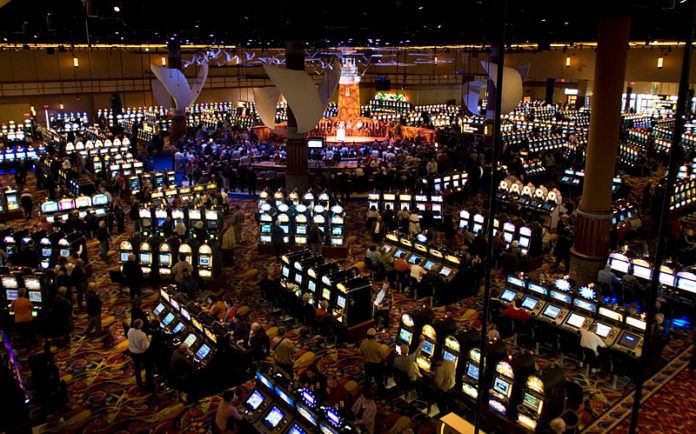
DARTMOUTH – While the number of Rhode Islanders who visited Twin River declined 9.1 percent from 2010 to 2012 to 161,726, according to the latest version of the New England Gaming Behavior Survey compiled by the Center for Policy Analysis at the University of Massachusetts Dartmouth, those who came from Massachusetts increased 8.8 percent to 385,348, helping the Lincoln gaming facility gain less than one-half percent in visitors to 582,662 in the time period.
According to the survey, 51 percent of Rhode Islanders gambled legally in the last 12 months, either through state-supported lotto (which 41 percent of residents took part in), state lottery scratch tickets (32 percent) or at a casino (26 percent). Massachusetts residents were most likely to gamble (58 percent) and take advantage of state-supported lotto or scratch tickets (45 and 46 percent, respectively), but Connecticut led the way with casino visits, with 27 percent of its residents having played a legal game in the last twelve months.
While Rhode Island’s two slots parlors are located near the two largest gaming facilities in the United States, in Foxwoods Resort Casino and Mohegan Sun, the two local facilities, especially Twin River in Lincoln, hold a strong draw on people located close at hand. The UMass Dartmouth survey reported that about 90 percent of visitors to Newport Grand and Twin River traveled an hour or less to reach the gaming facilities, while 74 percent and 69 percent traveled an hour or more to reach Foxwoods or Mohegan Sun, respectively.
The researchers reported that the number of visitors to Foxwoods and Mohegan Sun declined 22 percent from 2008 to 2012. In the same time period, the number of visitors to Twin River increased 24 percent, although Newport Grand visitation declined 0.4 percent. One key factor for the increase at Twin River was the 2007 expansion of the facility, turning it into the fifth-largest gaming facility in the United States in terms of slot positions, while at the same time adding restaurants, a bar and lounge, a 2,000 seat entertainment arena and virtual table games. And, following the passage of a ballot initiative in November, Twin River will be adding table games and become a 24×7 casino.
Rhode Islanders specifically traveled significantly less to the two Connecticut Native American casinos, as the number of visits to Foxwoods declined 49 percent from 2006 to 2012 and 37 percent to Mohegan Sun from 2006 to 2012. At the same time, visits from Massachusetts residents to Foxwoods fell 37 percent in that time period, although they dropped just 2 percent to Mohegan Sun.
In addition to tracking the behavior of New Englanders who gamble, the survey painted a demographic picture as well. For instance, while visitors to Foxwoods and Mohegan Sun were split evenly by sex, 57 percent of those from Rhode Island who went to the Connecticut facilities were women. Rhode Island visitors to the Connecticut facilities also had the highest percentage of having up to a high school degree, 38 percent, compared with the average for New England of 31 percent. Rhode Islanders also had the largest percentage of visitors with annual family income of less than $45,000, 34 percent, compared with 26 percent across all New England visitors.
Many of the visitors to the two Rhode Island gambling facilities go more than once per year. Thus, while the number of visitors to Twin River and Newport Grand totaled 582,662 and 114,877, respectively, the number of visits came to 3.1 million and 371,436 at Twin River and Newport Grand, respectively. Growth was pronounced among Bay Staters who went to the Lincoln slots parlor, who logged 588,414 visits in 2006 but 2.1 million in 2012, a gain of 261 percent. At the same time, visits by Rhode Islanders increased 2 percent to 886,905. Visits to Newport Grand by Massachusetts residents increased 18 percent to 158,849 even as the number of visits by Rhode Islanders fell 37 percent to 204,313.
Similar to the gender split for visitors to the Connecticut casinos, 56 percent of Ocean State residents who went to Twin River or Newport Grand were women. And while 36 percent of visitors to the two Rhode Island gambling facilities had a high school education or less, that percentage was 40 percent for visitors from Massachusetts. Forty-three percent of Rhode Island residents who went to the two state gambling facilities had family income of $45,000 or less, compared with 15 percent of those who came from Massachusetts, according to the survey.
The survey also collected data on how patrons to the gambling facilities spent their money. For instance, while 83 percent of Rhode Island resident visitors to Twin River and 92 percent of the same group to Newport Grand reported spending money on gambling, 79 percent of Rhode Island visitors to Foxwoods and 68 percent of visitors to Mohegan Sun did the same. And while 90 percent of Ocean State residents who visited the Connecticut facilities reported spending money on food, the same could be said of 80 percent of in-state visitors to Twin River and 85 percent of visitors to Newport Grand.
The survey, begun in 2006, is conducted every two years and tracks the changing habits of New Englanders who engage in legal gambling. This most recent survey was based on questionnaires completed by 3,035 residents of Rhode Island, Connecticut, Maine, Massachusetts and New Hampshire.
To view the entire survey, click HERE.












